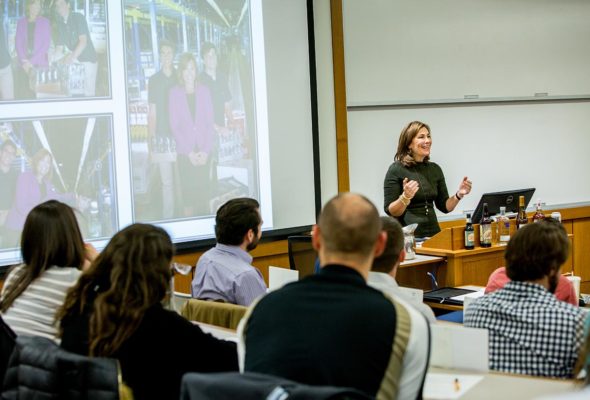One of the most-explored and desired processes of today’s global business marketplace is innovation. In this highly digitized age, where entrepreneurship and start-up ideas are encouraged and often fostered, traditional organizational hierarchies can be brushed to the side. The power of a game-changing idea has the ability to transcend this traditional structure, leaving room for equal places of contribution to the table.
 The most recent broadcast of the Executive MBA program’s “Live from Olin Business School” webinar series challenged the common notion that a leader should not be involved in the innovation process. Stuart Bunderson, Associate Dean & Director of Executive Programs, the George & Carol Bauer Professor of Organizational Ethics & Governance and Co-Director of the Bauer Leadership Center, presented the webinar. In “Leading Innovation without Getting in the Way,” Bunderson broke down just why innovation does not work effectively without the involvement of a strong leader.
The most recent broadcast of the Executive MBA program’s “Live from Olin Business School” webinar series challenged the common notion that a leader should not be involved in the innovation process. Stuart Bunderson, Associate Dean & Director of Executive Programs, the George & Carol Bauer Professor of Organizational Ethics & Governance and Co-Director of the Bauer Leadership Center, presented the webinar. In “Leading Innovation without Getting in the Way,” Bunderson broke down just why innovation does not work effectively without the involvement of a strong leader.
By citing the famous example of the 1999 IDEO shopping cart video, in which an IDEO team redesigned the standard shopping cart in just five days, Bunderson showed how innovation is a process buffeted by the contribution of members from each level of a hierarchical system. IDEO, a Palo-Alto, California based invention company, had not formally defined hierarchy of its shopping cart team. Team members were encouraged to contribute ideas equally in the short five-day due date.
 Buoyed by this timeline, key members of the team did help drive the process forward, each with a specific role to play. Narrowing down the best idea meant that contributions from the group facilitator, company founder and more experienced members led the team to a revolutionary approach to the shopping cart.
Buoyed by this timeline, key members of the team did help drive the process forward, each with a specific role to play. Narrowing down the best idea meant that contributions from the group facilitator, company founder and more experienced members led the team to a revolutionary approach to the shopping cart.
Bunderson emphasized that a social hierarchy helps innovation. Hierarchy is a natural occurrence because of differences in expertise, education, and other characteristics within groups of people. It contributes to the function of groups, most particularly where there is a problem that needs to be solved in a specific amount of time, such as the IDEO shopping cart proposal. These types of “problem parameters” encourage creativity, because time and resource restraints often can produce the most skilled outputs from group members.
Because of this organizational behavior, leadership develops. Leaders become moderators of sorts, making sure that voices are heard and the ideas of team members are not drowned out. This is not for the leader’s professional benefit, but for the guidance of the team and its product output. If there are disagreements, a group can be sidetracked from its goal and its organizational structure. A leader, produced from a social hierarchical system, will settle these disagreements and achieve coordination. In other words, keeping the eyes on the prize – a group or organization requires leadership to encourage direction over conflict, move things forward and foster innovation.
The ancient quote from Lao Tzu, from the Tao Te Ching, best sums up what Bunderson conveyed in his research findings:
“A leader is best when people barely know he [or she] exists, when his [or her] work is done, his [or her] aim fulfilled, they will say: we did it ourselves.”
Please visit www.olin.wustl.edu/EMBAevents to register for the next “Live from Olin Business School” event and to learn more about the Executive MBA program.











